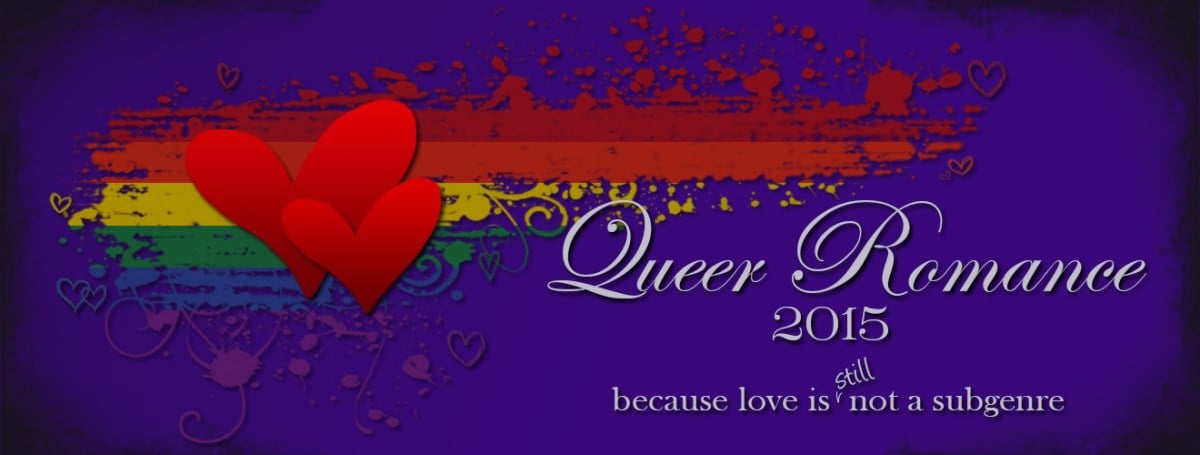Queer Romance Month, now in its second year, is a month-long celebration of romance across the LGBTQ+ spectrum, with posts from a variety of readers, writers, bloggers and more, united by our belief that love is love and nobody’s sexuality is a sub-genre.
This is important. Romance, as a genre written by, for and about women, has taken a lot of flak over the years. It gets slammed by men for being about women. (Apparently it’s pathetic for women to aspire to fulfilling sexual and romantic relationships. I can’t imagine why some men find this threatening.) The abuse is plentiful and all too often used by people who should know better. “Mary-Sue, wish-fulfilment, churned out by housewives and read by Wal*Mart cashiers”: the misogyny and snobbery never stops. (I saw “written by housewives” just this morning. The term for women who write books, FYI, is “authors”.) Romance is about love, about human connections and caring, about all the values that Western culture stereotypes as female, and therefore we are told it is schlock.
Well, romance denies patriarchy. Romance prizes the values that patriarchy types as ‘female’ and therefore lesser: love, caring, communication. Romance says that Heterosexual Man™ is not the whole story, or even the centre of it: at most he’s half. And with queer romance, he’s not in there at all, because sorry guys but it’s not always about you.
Romance says that we all deserve love, that we all deserve to be valued and to have our voices heard, that we’re entitled to pursue sexual pleasure if and as we like. That we all deserve to be the centre of the story, to define what our story should be. That everyone can hope for a happy ending.
And “everyone” does not mean just heterosexuals, or just white able-bodied cis people: it means everyone. Romance has long been predominantly white cis het as a genre, and mostly written and read by women. But that’s changing, as groups like @WOCInRomance promote romance by and about POCs; gay/bi male, trans and nonbinary voices and stories are coming through; and more male readers discover that, actually, romance novels are pretty good.
We started Queer Romance Month to promote LGBTQ+ stories within romance because they deserve to be heard. LGBTQ+ people have so often been written out altogether, relegated to side characters, subplots, and tragic fates. Queer romance offers a world that isn’t dominated by cis het men or by the constricted, damaging idea of masculine superiority that depends on denying emotions. In queer romance, people can be accepted for themselves. Women can pursue their pleasure as they choose with whoever they choose. Men can talk, and be vulnerable, and find acceptance outside the imposed rules of patriarchy. People can be who they are. (And everyone can also be CIA agents/werewolves/billionaires to taste, because this is romance, not a doctoral dissertation.)
Women of whatever orientation need to be at the centre of their own stories. Queer people of whatever gender identity need to be at the centre of their own stories. We all need stories.
If you want to explore those stories, Queer Romance Month is right here throughout October to introduce you to some terrific authors, YA, NA and adult; stories that run from light and sweet to dark, scary and blisteringly hot; all the genres from contemporary, to SFF, suspense, paranormal, historical; and most of all, people: lesbian, gay, bi, trans, queer, asexual, other.
In Queer Romance Month, we celebrate reading what you like, writing what you love, and being who you are. Come and join us.
KJ Charles is a romance author, freelance editor and Twitter addict with a semi-regular blog on reading, writing and editing. Her latest release is A Fashionable Indulgence, published by Loveswept.
—Please make note of The Mary Sue’s general comment policy.—
Do you follow The Mary Sue on Twitter, Facebook, Tumblr, Pinterest, & Google +?









Published: Oct 1, 2015 01:43 pm